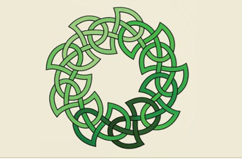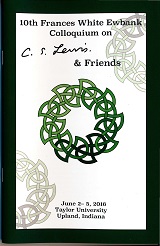Event Title
Paper Session 3-A: Friends Further Afield
Location
Euler 100
Start Date
3-6-2016 11:00 AM
Description
"Henry More (1614-1687) and C. S. Lewis: Cambridge Platonism and its Influence on Lewis's Life and Thought" - Susan Wendling
While scholars acknowledge that C.S. Lewis is a "Platonist Christian, very few have explored how extensively this influence can be traced. Reviewing key facts of Lewis's biography from the beginning of his academic career, this paper will establish that prior to his full conversion to Christianity in 1930-31, Lewis read an early biography of Henry More and several of his key writings. In particular, An Explanation of the Grand Mystery of Godliness (1660) warns of the dangers of Atheism, Enthusiasm, Calvanism and Romanism. These key points resonate with Lewis scholars as Lewis himself moved from atheism to idealism to theism to Christianity, all the while being attracted to the Platonic triad of Truth, Goodness and Beauty. This essay will describe some details of More's intellectual system of Christian Platonism as well as his reputation for sanctity. Some intriguing details of Lewis's personal life will be seen as paralleling More's life. The essay concludes by explaining how More, as well as Lewis, reconciled "Christian Platonism--its insistence that Man can rationally know God, grow in godliness through embodying the virtues, and belief in the Neoplatonic structure of the cosmos--with loyalty to the Anglican Church.
"The Influence of Wagner's Music in C. S. Lewis's Friendships and Writings" - John MacInnis
C. S. Lewis's oldest friend and correspondent was Arthur Greeves, his childhood companion from Belfast, and the music of Richard Wagner was mentioned consistently in their letters. Throughout his life, as he wrote Greeves, Lewis critiqued Wagner performances and referred again and again to how they both felt as youths while hearing Wagner's music and studying Arthur Rackham's illustrations to The Ring. Lewis credited the moment of his imaginative renaissance, as a young teenager, when he encountered the words "Siegfried and the Twilight of the Gods" paired with Rackham's illustrations. Later, Lewis pointed to his sudden love for Wagner and what he called "Northernness" as a grace; he thought God was calling him back to faith through these old stories and music. Lewis repeatedly sought out opportunities to experience Wagner's music with friends (e.g., Greeves, Barfield, Tolkien, his brother, and others), and Wagner's music factors into many of Lewis's writings. Using historic recordings and Rackham's illustrations, this paper will examine the complex influence of Wagner's music throughout Lewis's life, in his friendships and in his own creative work. Special attention will be made to Lewis's evolving approach to Wagner's music culminating in his book, An Experiment in Criticism.
"Sister Penelope Lawson CSMV: Her Heritage, Life, Writings and Legacy" - Richard James
To many devotees of C.S. Lewis, the Anglican nun, Ruth Penelope Lawson is best known for two things: first of all, for her twenty-four year correspondence with Lewis, often serving in that epistolary friendship much like his elder spiritual sister and confidante, and secondly, for her 1944 English translation of On the Incarnation by Athanasius for which Lewis also provided an introduction. In the twelve years from 1998 through 2009, two biographic entries by Walter Hooper and two separate articles on her by Clara Sarrocco and Will Vaus have also provided much additional insight about her relationship with Lewis, principally in the context of their correspondence. But none had yet focused primarily on Sister Penelope herself as has been done recently with other significant women writers in his life. In this presentation I propose to remedy this lack, by looking more thoroughly at her Anglo-Catholic heritage, her education, training and service as "a religious of CSMV" and by providing further information on her writings, including an updated bibliography of her books, translations, essays, poems, plays and book reviews.
Event Type
Paper
Paper Session 3-A: Friends Further Afield
Euler 100
"Henry More (1614-1687) and C. S. Lewis: Cambridge Platonism and its Influence on Lewis's Life and Thought" - Susan Wendling
While scholars acknowledge that C.S. Lewis is a "Platonist Christian, very few have explored how extensively this influence can be traced. Reviewing key facts of Lewis's biography from the beginning of his academic career, this paper will establish that prior to his full conversion to Christianity in 1930-31, Lewis read an early biography of Henry More and several of his key writings. In particular, An Explanation of the Grand Mystery of Godliness (1660) warns of the dangers of Atheism, Enthusiasm, Calvanism and Romanism. These key points resonate with Lewis scholars as Lewis himself moved from atheism to idealism to theism to Christianity, all the while being attracted to the Platonic triad of Truth, Goodness and Beauty. This essay will describe some details of More's intellectual system of Christian Platonism as well as his reputation for sanctity. Some intriguing details of Lewis's personal life will be seen as paralleling More's life. The essay concludes by explaining how More, as well as Lewis, reconciled "Christian Platonism--its insistence that Man can rationally know God, grow in godliness through embodying the virtues, and belief in the Neoplatonic structure of the cosmos--with loyalty to the Anglican Church.
"The Influence of Wagner's Music in C. S. Lewis's Friendships and Writings" - John MacInnis
C. S. Lewis's oldest friend and correspondent was Arthur Greeves, his childhood companion from Belfast, and the music of Richard Wagner was mentioned consistently in their letters. Throughout his life, as he wrote Greeves, Lewis critiqued Wagner performances and referred again and again to how they both felt as youths while hearing Wagner's music and studying Arthur Rackham's illustrations to The Ring. Lewis credited the moment of his imaginative renaissance, as a young teenager, when he encountered the words "Siegfried and the Twilight of the Gods" paired with Rackham's illustrations. Later, Lewis pointed to his sudden love for Wagner and what he called "Northernness" as a grace; he thought God was calling him back to faith through these old stories and music. Lewis repeatedly sought out opportunities to experience Wagner's music with friends (e.g., Greeves, Barfield, Tolkien, his brother, and others), and Wagner's music factors into many of Lewis's writings. Using historic recordings and Rackham's illustrations, this paper will examine the complex influence of Wagner's music throughout Lewis's life, in his friendships and in his own creative work. Special attention will be made to Lewis's evolving approach to Wagner's music culminating in his book, An Experiment in Criticism.
"Sister Penelope Lawson CSMV: Her Heritage, Life, Writings and Legacy" - Richard James
To many devotees of C.S. Lewis, the Anglican nun, Ruth Penelope Lawson is best known for two things: first of all, for her twenty-four year correspondence with Lewis, often serving in that epistolary friendship much like his elder spiritual sister and confidante, and secondly, for her 1944 English translation of On the Incarnation by Athanasius for which Lewis also provided an introduction. In the twelve years from 1998 through 2009, two biographic entries by Walter Hooper and two separate articles on her by Clara Sarrocco and Will Vaus have also provided much additional insight about her relationship with Lewis, principally in the context of their correspondence. But none had yet focused primarily on Sister Penelope herself as has been done recently with other significant women writers in his life. In this presentation I propose to remedy this lack, by looking more thoroughly at her Anglo-Catholic heritage, her education, training and service as "a religious of CSMV" and by providing further information on her writings, including an updated bibliography of her books, translations, essays, poems, plays and book reviews.


